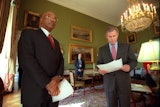Saying that “we have been silent for too long,” a group of African-American newspaper publishers have enlisted the support of Black colleges and churches as they prepare to wage a war against HIV/AIDS using their own media outlets to inform readers, advocate for prevention, and hopefully save lives.
By next January, the publishers of more than 50 Black newspapers, most of them weeklies, in Georgia, Tennessee, Florida, South Carolina, North Carolina, Alabama and Mississippi say they plan to start regularly carrying advertising, running columns, publishing news stories, and posting video on their official websites that address the AIDS crisis and what their readers can do to protect themselves against the disease.
The region these papers represent—the southeast—is where more than 41 percent of those living with AIDS in the United States reside and where the highest number of new AIDS cases is reported, a 2010 report from the Southern AIDS Coalition found.
Meharry Medical College, NIMHD/Health Disparities Research Center in Nashville, Tenn., was the co-sponsor of the annual meeting of publishers and owners, representing the southeast region of the National Newspaper Publishers Association (NNPA). Their annual meeting in Orlando, 17-18 November, was devoted to education about HIV/AIDS and the escalation in rates of sexually transmitted diseases (STDs). The Southeast Region Publishers’ HIV/AIDS Awareness Conference: Caring for Communities of Color brought together more than 80 Black college students and their advisers, HIV/AIDS scientists, faculty, clergy and members of the Black Press to heighten awareness and begin a dialogue around a disease that’s now in its 30th year.
“We are committed to telling these stories and educating our communities,” said the Rev. Dr. R.B. Holmes Jr., president of the National Newspaper Publishers Association (NNPA) Southeast Region and publisher of the Capital Outlook in Tallahassee, Fla.
“The strategy for our papers is going to be to write about it (HIV/AIDS), tweet about it, blog about it, teach it, and preach it. No longer will the Black Press be silent when it comes to HIV/AIDS,” Holmes added.
About a dozen HBCUs were in attendance. During the conference, the publishers also began discussions about extending NNPA membership to Black college newspapers.
Holmes said the HIV/AIDS “movement” being launched by the NNPA will include working with HBCU campus newspapers, radio and television stations, fraternities and sororities, and administrators, all necessary resources for delivering important HIV/AIDS prevention and education messages to college students who account for about 55 percent of all HIV infections among those ages 13 to 24, according to the Centers for Disease Control and Prevention (CDC).
Participants also heard about another troubling young population group at high risk for contracting HIV—African-American men (13-29) who have sex with men or MSMs. These males accounted for 14 percent of new infections in 2009, said Dr. Donald Alcendor, an HIV scientist with the Center for AIDS Health Disparities Research at Meharry Medical College, who described his presentation, “An Overview of HIV/AIDS,” as scientifically based and often “hard-hitting.”
Locally in Nashville, teens, their parents and teachers have been a special focus of Meharry’s HIV/AIDS education outreach in the community, added Alcendor, who regularly brings these students to the campus and into his research.
“We are prepared to share the outreach model that we developed at Meharry with the NNPA. The model doesn’t have to be focused on teens, but, when you see the number of new infections among 13- to 29-year-old Black youth and men having sex with men, they may want to use it,” Alcendor said.
Holmes said the publishers are also looking to Meharry for models and resources that can help HBCU students make healthy life choices, including being tested for HIV and sexually transmitted diseases.
Melva Lisa McDonald-McGee, M.Ed., who directs the HBCU Wellness Project/CoverKids Initiative at Meharry, and Dr. Wilbert C. Jordan, an associate professor of internal medicine at the Charles R. Drew University of Medicine and Science in Los Angeles, also led conference workshops.
“This was truly an exciting marriage,” said Dr. Pat Matthews-Juarez, a professor in the Department of Family and Community Medicine at Meharry Medical College of the first-ever gathering that brought together those she said who are not often at the same table when it comes to mobilizing around HIV/AIDS in the Black community—religious leaders, academics, students, researchers and the media.
Matthews-Juarez, a conference organizer and presenter, said “we provided them with plain talk about HIV/AIDS as well as scientific talk that got translated in a way that everyone could understand, take back with them, and use.”
As African-Americans, who account for more than 50 percent of all new cases of HIV, continue to bear the most severe burden of the disease, Matthews-Juarez said stepped-up education is needed to “eliminate and reduce the number of new cases we are seeing in the Black community and among our college students.”















